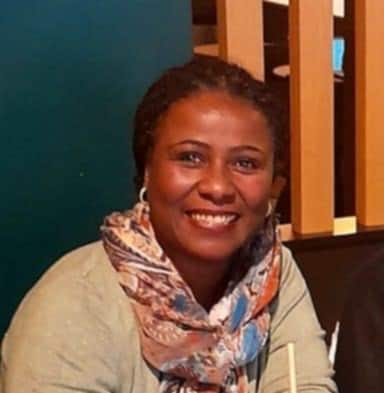On the occasion of February 6th and the opposition to female circumcision in many African and Arab countries.
I promised my mother to visit her once a year—I didn’t visit her. I visited my father instead. I brought neither wheat nor water as we should when we are visiting our dead loved ones. I had nothing but a coat to ward off the ice that inhabits me and a bag full of pity for him out of my tales. His grave was as I had seen it last time. Like most neighboring graves: the parasitic grasses had sprouted around its edges and the plastic garbage brought up by winds and neglected by the cleaner. He received me with an evasive smile, something between joy and blame. He didn’t understand what was behind my visit to him instead of my mother. I was a little confused; we shook-hands He asked me about my early arrival rather than blaming me for not being loyal to my mother. I have told him that I was hanging up between staying and leaving. I had just come to tell him a tale that would confuse him as my arrival did! I sat at his head; his grave opened such a small skylight like from which I stretched my hand. I touched his white shawl and then wrapped it with my fingers in tension. I told him that I’m bringing my own body to be with him for eternity, his grave’s dirt shook under me. There was an undefined roaring sound as if the earth was going to be split. His arm reached me from the same skylight—he embraced me; his hand that often patted my shoulder stretches to me. I placed him close to me and laid my head on his palm.
He said:
“Your aunt was a pretty one. Men called her al-Jazyah. They long fought to win her, but when they decided to settle their differences, to leave her uncustomary alone to choose her prince charming, she disappeared. On a darkest night she had a mug of water, and she asked to visit a friend. My father prayed for her safety. She had gone but never returned. Many years later, a niece appeared to us demanding the blood of her mother who died one winter morning after her husband lit her with wood for warmth, so the circumcision scar was torn, she died and in her heart were stories that she did not tell anyone!”
I said in a trembling voice:
My father, I have come back! I was stuffed by pain, disappointment, failure and a bewildered heart. Just like my aunt carrying my tales which are unlike what you had read in books. A man who my fate has dashed to, he let me fall down, he filled my cups with blood and everything vanished! I wasn’t enough useful enough for his sowing. Before he broke down crying, he accused me of being dead. My father, I’m a dead body! Why am I a victim twice?
His chilly hand warmed me, as usual he whispers: “It is the tradition my daughter. Tradition can’t be altered.”
I said:
“In that night, I saw them thrilled upon my screaming, purified by my blood when you weren’t there, I heard them admit my nightmares, exchanging congratulations, and then I didn’t’ wake up!”
A hand stretched out and I was overwhelmingly being swallowed by the darkness of the grave. We were three: my father, my husband and I. Men with turbans and books buried us in the meantime, some women pulled their hair, sobbing, and others ululating and calling me the nymph of paradise. I died as a bride, with a hand dyed with henna!
Fathia Debech

وعدتُ أمي أن أزُورها في السنة مرةً، لم أفعل. هذه السّنة، زرتُ أبي، لم أُحضر معي ماءً وقمحاً كما جرت العادة عندنا حين نزور موتانا. لم يكنْ معي إلاّ معطفٌ يرد الجليد الذي يسكنني، وجرابٌ مليئةٌ بالشفقةِ عليه من حكايتي.
كان قبرُه كما تركته آخر مرة، ككلّ القبورِ المجاورةِ نبتت على حاشيتِه الأعشابُ الطفيليةُ والفضلاتُ البلاستيكيةُ التي حملتها الرياحُ وأهملتها يدُ عامل التنظيف.
استقبلني بضحكةٍ مواربةٍ بين البهجةِ والعتابِ. لا يفهم أبي سرّ مجيئي إليه بدلًا عن أمّيْ، ارتبك قليلاً، سلّمنا، وسألني سرّ هذا المجيء المبكّر قبلَ أن يعاتبني على عدم الوفاء لأمّي!..
أخبرتُه أنني بين البقاءِ والرّحيلِ و أنّني أريد أن أقصّ عليه حكايةً ستربكُه كما فعل به مجيئي!.
جلستُ عند رأسِه، انفتح لي في قبره بعض كوّة، مددتُ منها يدي، أخذتُ بطرفِ شالِه الأبيض ألفّه بين أصابعي توتراً.
قلت له؛ أنّني أحمل جثّتي لتُجاوره إلى غير أجل، يتمايل ترابُه تحتي، صوت ما يدوي كأن الأرضَ تنشقّ.
من نفسِ الكوّةِ يأتيني ذراعُه، يحتويني. يده التي طالما ربتّت على كتفِي تمتدّ نحوي، جعلتُ لي بقُربه موضعاً وألقيتُ رأسي على راحتِه…
قال:
– “كانت عمّتك حلوة جدّاً، يسمّيها الرّجال الجازية، طالما تقاتلوا للظّفرِ بها، عندما قرّروا حسم الخلاف وجعلها تختار فارسَها على غير العادة اختفت، في ليلة حالكةٍ جاءت بإبريق الماءِ واستأذنَت لزيارة صديقة لها، دعا لها أبي بالسّلامة… ذهبت ولم تعد… بعد سنواتٍ من البحثِ، ظهرَ لنا ابنة أخت تطالبنا بدمِ أمّها التي ماتت صباح ليلةٍ شتويّةٍ بعد أن أشعلها زوجُها حطباً للتّدفئة، فتمزّقت ندبةُ الختان، ماتت وفي قلبِها حكايات لم تقصّها على مسامع أحد!”
قلت له بصوتٍ مرتجف:
– “لكنني عدتُ يا أبي! عدتُ! عدتُ محمّلةً بشيء من الوجَعِ والخيبةِ وقلبٍ فيه من الهمّ الكثير، لكنّني يا أبي كعمّتي، أحملُ حكاياتي وهي ليست كتلك التي قرأتُها في الكتب. الرّجل الذي زفّني إليه قدري سرعان ما نفض منّي يديه، ملأ كؤوسي دمعاً و انتهى! لم أكنْ أصلح حرثاً له، قبلَ أن يداهمه البكاء عليّ، اتّهمني بالموت.. أنا جثّة يا أبي! أنا الذبيحة مرّتين.. لماذا يا أبي؟! “
يدُه الباردة ملأتني دفئاً وصوتُه كعادته يهمسُ:
– ” هو العرفُ يا بُنيّة و كيف للعُرف أن يُمْحَى!”
قلت:
– “رأيتهن يا أبي في ليلتي تلك، يزغردن على وقعِ صُراخي و يتطّهرْنّ بدمي و دمْعي وأنت بعيد، سمعتُهُن من بين كوابيسي كلّها يتبادلن التّهاني و بعدها لم أستيقظ!”
تمتدّ يد ويد ويبتلعني ظلام سميك في عتمةِ القبرِ، كنّا ثلاثتنا، أبي، أنا وزوجي، وارانا التّراب رجال بعمائمٍ وكتبٍ، بينما نساء – بعضُهن- ينكشن الشعرَ وينتحبْن و-بعضُهُنّ- يُزغردن وينعتني بحوريّة الجنّة، متّ عروساً، يدي مخضبّةً بالحنّاء!
فتحية دبش

فتحية دبش:
روائية ومترجمة ومؤلفة وناقدة تونسية/ فرنسية، حصلت على دراستها الأكاديمية في تونس وفرنسا في الآداب واللغة العربية. تعتبر من أبرز الكاتبات في العالم العربي. تكتب على بكثافة في المجالات الثقافية والمناظرات. حازت على جائزة كتارا المرموقة للرواية العربية 2019 عن روايتها (ميلانين) التي زادت من شهرتها على نطاق واسع في العالم أجمع. بالإضافة إلى رواياتها ومجموعاتها القصصية القصيرة، تقوم بالترجمة من الفرنسية إلى العربية، كما تشمل مشاركاتها الأدبية والثقافية المنتديات الفكرية والمؤتمرات في المحيط العربي والخارج، تتناول كتاباتها بالهجرة والتهميش وحقوق الإنسان.
حظيت كتاباتها بإشادة نقدية لأسلوبها الكتابي الخيالي والمرئي العميق. تعيش حاليًا في مدينة ليون في فرنسا.
Fathia Debech is a Tunisian French novelist, translator, author and critic. She earned her academic studies in Tunis and France in literature and Arabic language. She is considered to be one of renown female-writers in the Arab world. She writes extensively in the cultural realms and debates. She has been awarded the prestigious Katara Prize for the Arabic Novel 2019 for her novel (Melanin) which has widely ranked her in the world at large. In addition to her novels and short stories collection, she translated from French to Arabic, also her literature and cultural participation includes intellectual forums and conferences in the region and abroad interested in immigration, marginalization and human rights. Her writings have received critical praise for their imaginative and profoundly visualized style of writing. Currently, she lives in the city of Lyon in France.


Translated by Nassir al_Sayeid al-Nour

About the Translator: Nassir al-Sayeid al-Nour is a Sudanese critic, translator and author.
